De Nederlandse dichter en schrijver Mark Boog werd geboren op 24 september 1970 in Utrecht. Zie ook alle tags voor Mark Boog op dit blog.
Het gietijzer van stations…
Het gietijzer van stations, het glas, je handen.
Deze schoonheid is breekbaar, is te ontkennen,
maar overtreft ons. Ik ben klein in je nabijheid
als een tor in het hoge gras, dapper ploeterend –
in de verte ben ik groter, spookhuis, het vervormde
beeld in de gekromde spiegel. Spinnenweb, skelet,
gehuil van witte geesten, onecht als alle dagen,
vals als jij. Maar wij schrikken zo snel niet meer,
wij laten ons nog slechts elkaar op het lijf jagen.
We reizen van ons vandaan, elke dag, zo ver
als we durven, met het oog op bestemming. Niets
minder dan dat. Ik zie je van verre komen, gaan.
Atleet
Alle ramen zijn open. De geluiden van binnen en buiten
mengen zich; mengen zich met het licht en de gedachten.
Uiterst verwonderlijk is deze lijdzaamheid. Met handen
waarin geen zand en ogen onder leden wachten we lang.
Het zeggen is bijkomstig. In de verste stilste hoeken
is er plaats voor, tussen het gebeuren, naast het wachten.
Er beweegt zich een atleet door de gangen van het huis,
langs de kamers waarin we zitten, er klinkt voorbijgaan.
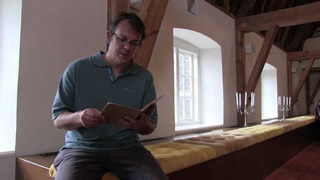
De Nederlandse schrijver A.L. Snijders (pseudoniem van Peter Cornelis Müller) werd geboren op 24 september 1937 in Amsterdam. Zie ook alle tags voor A.L. Snijders op dit blog.
Uit: Het Huwelijk
“De ceremoniemeester van het huwelijksfeest heeft gevraagd of ik iets realistisch wil zeggen. Ik bedenk dat je alleen het huwelijk van je ouders van binnenuit kent, en dat van jezelf. Van alle andere huwelijken ken je slechts de buitenkant. Daarom wend ik me voor een volledig beeld tot de poëzie en kom meteen bij Het Huwelijk van Willem Elsschot, het bekendste gedicht uit onze literatuur. De moeilijkheid is dat alle vrouwen die ik ken het onaangenaam vinden, het verval van de vrouw, de spijt van de man. Maar voor mij zijn dat details, de hoofdzaak is de weemoed, de stille kracht die onbenoembaar is, en superieur aan de woede en de spijt. Dus lees ik op het feest, nadat iemand aan het glas heeft getikt, het vijfde couplet voor om een ieder stil te houden en mijn gelijk te halen. Maar doodslaan deed hij niet, want tusschen droom en daad staan wetten in de weg en praktische bezwaren, en ook weemoedigheid, die niemand kan verklaren, en die des avonds komt, wanneer men slapen gaat. Later op de avond, na het dansen, word ik aangesproken door een zestienjarig meisje dat me vertelt dat het gedicht juist die week op school is behandeld en dat de leraar de nadruk heeft gelegd op de mislukking, op het beeld van de man die bewegingloos en zwijgend bij het vuur gezeten, een godvergeten en vervaarlijke’ aanblik bood. Ik zeg: Leraren geven een aanzet, jij moet het verder zelf doen. Hang het gedicht boven je bed, lees het honderd keer, maak zelf een voorlopige keuze, en laat die altijd voorlopig blijven.”
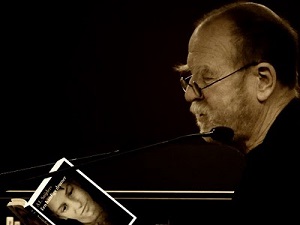
De Amerikaanse schrijver Francis Scott Fitzgerald werd geboren op 24 september 1896 in Saint Paul, in de staat Minnesota. Zie ook alle tags voor F. Scott Fitzgerald op dit blog.
Uit: The Great Gatsby
“And so with the sunshine and the great bursts of leaves growing on the trees, just as things grow in fast movies, I had that familiar conviction that life was beginning over again with the summer.
There was so much to read, for one thing, and so much fine health to be pulled down out of the young breath-giving air. I bought a dozen volumes on banking and credit and investment securities, and they stood on my shelf in red and gold like new money from the mint, promising to unfold the shining secrets that only Midas and Morgan and Maecenas knew. And I had the high intention of reading many other books besides. I was rather literary in college — one year I wrote a series of very solemn and obvious editorials for the “Yale News.”— and now I was going to bring back all such things into my life and become again that most limited of all specialists, the “well-rounded man.” This isn’t just an epigram — life is much more successfully looked at from a single window, after all.

It was a matter of chance that I should have rented a house in one of the strangest communities in North America. It was on that slender riotous island which extends itself due east of New York — and where there are, among other natural curiosities, two unusual formations of land. Twenty miles from the city a pair of enormous eggs, identical in contour and separated only by a courtesy bay, jut out into the most domesticated body of salt water in the Western hemisphere, the great wet barnyard of Long Island Sound. They are not perfect ovals — like the egg in the Columbus story, they are both crushed flat at the contact end — but their physical resemblance must be a source of perpetual confusion to the gulls that fly overhead. To the wingless a more arresting phenomenon is their dissimilarity in every particular except shape and size.
I lived at West Egg, the — well, the less fashionable of the two, though this is a most superficial tag to express the bizarre and not a little sinister contrast between them. My house was at the very tip of the egg, only fifty yards from the Sound, and squeezed between two huge places that rented for twelve or fifteen thousand a season.”
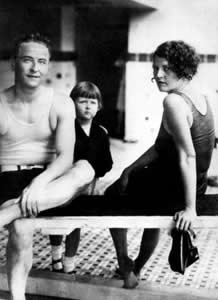
Fitzgerald hier met vrouw Zelda en dochter Scottie in 1927
De Britse schrijfster en filmmaakster Shamim Sarif werd geboren op 24 september 1969 in Londen. Zie ook alle tags voor Shamim Sarif op dit blog.
Uit: The World Unseen
“Miriam held the baby close and thought that Amina herself lived a very different life from her own.
“You ‘ve been on the Garden Route?” she asked, her tone wistful.
Amina nodded. “Twice,” she said.
Miriam turned and sat the baby down amongst her toys on the floor behind the counter, pausing to touch her soft hair.
“I’ve never been anywhere,” she said, straightening up. “Only to Pretoria.”
Miriam hardly noticed the girl move, but suddenly Amina was standing right before her, with only the counter top between them.
“Come with me to Cape Town,” she offered, and her tone was one that Miriam recognised from before, flirtatious and laughing. She was looking Miriam directly in the eyes, and then she looked, disconcertingly, at her mouth. Miriam pulled back, for Amina was standing so close to her that she could catch the fresh scent of her, a scent that she still remembered well from the night the girl had stayed over. Miriam said nothing, but came out from behind the counter and went back to her spot by the open door.
“Come with me,” said Amina again, more serious this time. “It would be company for me. And we could take turns with the driving.”
“I can’t drive,” said Miriam.
Amina considered this. “Well, I don’t really need help with the driving…”
“I can’t go with you,” Miriam told her abruptly. “I have a husband and three children and a shop to look after.” She looked away, and they were both silent, listening to the rain and the blues tune that floated out from the radio.”
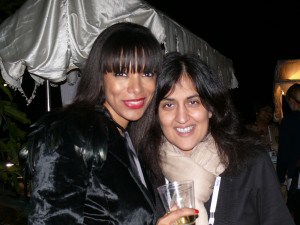
Hier met zangeres en actrice Leonie Casanova (links)
De Nederlandse dichter Hendrik Tollens werd op 24 september 1780 te Rotterdam geboren. Zie ook alle tags voor Hendrik Tollens op dit blog.
Het roosje
Een jonge tuinman kweekte teder
Een roosje, dat zijn bloembed droeg;
Behoedde ’t wel voor buiig weder,
En gaf het warmte en vocht genoeg.
’t Was eindlijk zeldzaam schoon ontloken,
En menig had en kocht het graag:
‘Het is voorlang mij reeds besproken’
Was elk bescheid op elke vraag.
Nu plukt hij ’t zorglijk van de stengel,
En laat er mee naar ’t landhuis gaan,
En de eedle vrouw, een jeugdige engel,
Nam zelf het bloempje lachende aan.
‘Hoe laat hij,’ sprak zij, ‘hoe zich noemen,
Die mij dat kostbaar roosje zendt?’ –
‘Hij is een vriend van schone bloemen:
Meer’, sprak de knaap, ‘is me onbekend.’
En toen zij rondreed in haar wagen,
De boezem met de bloem getooid,
Toen zag de tuinman ’t uit de hagen,
En blijder sloeg hem ’t harte nooit.
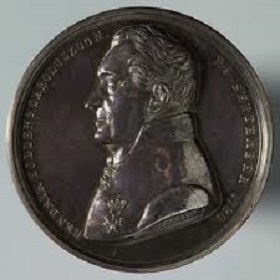
Zilveren penning bij zijn 70ste verjaardag
Zie voor nog meer schrijvers van de 24e september ook mijn blog van 24 september 2012 deel 2 en ook mijn blog van 24 september 2011 deel 2.
